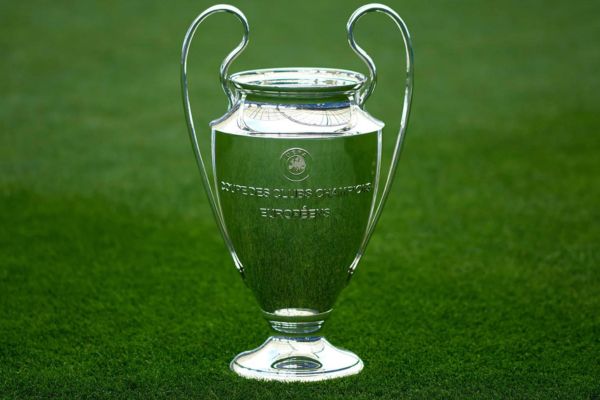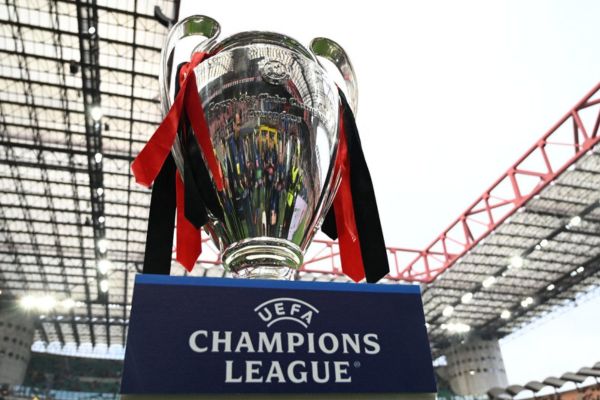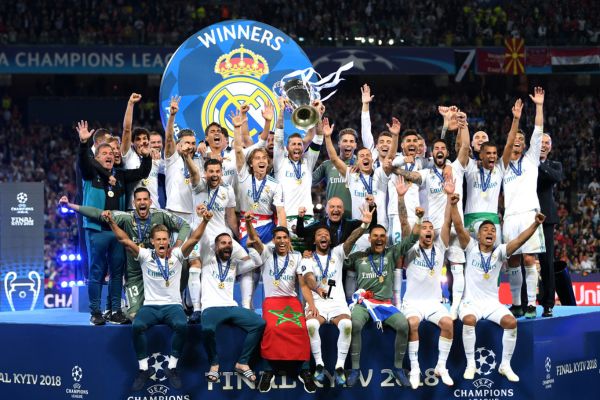How Does the Champions League Work? Full Details
1 year agoThe UEFA Champions League (UCL) is a name that is very familiar to football fans. However, not everyone may be fully informed about the UCL. So, how does the Champions League work, and what makes it important? Let's find out the details in this article.
Subscribe to ANZ Football live to get the fastest access to the latest football news and high-quality football streams.
What is the UEFA Champions League?

The UEFA Champions League (UCL) is the prestigious European club football championship, held annually and organized by the Union of European Football Associations (UEFA). It typically commences in mid-July, gathering the best-performing clubs from national championships across Europe. This highly esteemed tournament adds excitement to the continent's football leagues.
Each European country's national championship standings determine the clubs' qualification for the UCL. The competition is fierce, as teams vie for a spot in the Champions League, making the national championships even more competitive.
How many teams qualify for UCL from each league?

The UCL consists of 32 clubs, divided into 8 groups of 4 teams each. They play against each other in a round-robin format, with home and away matches. The top teams from the groups proceed to the knockout stage, where the organizers select the two best clubs to compete in the Champions League final held in late May.
The club that emerges victorious in the Champions League not only earns the prestigious title but also qualifies for the UEFA Super Cup and the FIFA Club World Cup.
History of the UCL

The history of the UCL is captivating, with the 2021 final attracting over 700 million viewers worldwide. It evolved from the European Cup, which was proposed in 1954 by Gabrief Hanot to create a competition among European champions. The inaugural match took place on September 4, 1955, between Sporting Lisbon and FK Partizan, with Real Madrid clinching the first victory.
In 1992, the European Cup was renamed the UEFA Champions League, becoming exclusive to national champions and cup holders from the previous season.
From 1955 to 1992, the competition followed a direct knockout format, with 32 teams competing in intense clashes until the two best reached the final.
After 2002, the tournament was simplified and became widely known as the "Champions League."
In the 2003 - 2004 season, the format changed to include only one group stage with 32 teams competing in round-robin matches to determine the finalists.
In the 2005 - 06 and 2006 - 07 seasons, Italy, England, and Spain were allowed to send four teams each to participate.
In the 2013 - 2014 season, Germany gained an additional spot, while Italy's participation was reduced to three teams.
Over its 60-year history, the UEFA Champions League has become the most prestigious and sought-after club football competition globally.
How do you qualify for UEFA Champions League?

Qualification for the UEFA Champions League is based on the performance of countries in European competitions. Twenty-four football clubs ranked high in their national championships and the current champions of the UEFA Champions League and UEFA Europa League directly enter the group stage.
Furthermore, there are play-offs and three qualifying rounds, from which six winning clubs also get to join the group stage. This system ensures that the most deserving teams compete in the UCL, raising the level of competition and excitement in European football. Here are the details:
- 10 national champions from countries ranked 1 to 10.
- 6 runner-ups from countries ranked 1 to 6.
- 4 third-placed teams from countries ranked 1 to 4.
- 4 fourth-placed teams from countries ranked 1 to 4.
- The current champions of the UEFA Champions League.
- The current champions of the UEFA Europa League.
- 6 winning teams from the play-off round.
European countries with higher FIFA rankings in the European region will have a greater number of teams participating in the Champions League. This is because countries with higher FIFA rankings tend to have well-established football systems and are given higher priority in terms of team allocations.
This allocation system ensures that the most competitive and skilled teams from the top-ranked countries have the opportunity to compete in the prestigious UEFA Champions League tournament. As a result, the Champions League features a high level of football talent and intense competition from the best clubs across Europe.
Which club has won the most Champions League?
Throughout the history of the UEFA Champions League, 22 football clubs have won the championship. Among them, the Spanish team Real Madrid is the club with the most titles.
| Club | Titles won | Years |
|---|---|---|
| Real Madrid | 14 | 1956, 1957, 1958, 1959, 1960, 1966, 1998, 2000, 2002, 2014, 2016, 2017, 2018, 2022 |
| AC Milan | 7 | 1963, 1969, 1989, 1990, 1994, 2003, 2007 |
| Bayern Munich | 6 | 1974, 1975, 1976, 2001, 2013, 2020 |
| Liverpool | 6 | 1977, 1978, 1981, 1984, 2005, 2019 |
| Barcelona | 5 | 1992, 2006, 2009, 2011, 2015 |
| Ajax | 4 | 1971, 1972, 1973, 1995 |
| Manchester United | 3 | 1968, 1999, 2008 |
| Inter Milan | 3 | 1964, 1965, 2010 |
| Juventus | 2 | 1985, 1996 |
| Benfica | 2 | 1961, 1962 |
| Manchester City | 2 | 1970, 2023 |
| Chelsea | 2 | 2012, 2021 |
Who is the highest goal scorer in the Champions League?
As of 2023, Cristiano Ronaldo is currently the all-time leading goal scorer in the history of the UEFA Champions League. He is followed by Lionel Messi, with 129 goals to his name.
Here's the list of the top 20 goal scorers in the history of the UEFA Champions League, along with their positions, names, number of goals, number of matches played, and goal-scoring ratio:
| Position | Player | Goals | Matches Played | Goal-Scoring Ratio |
|---|---|---|---|---|
| 1 | Cristiano Ronaldo | 140 | 183 | 0.77 |
| 2 | Lionel Messi | 129 | 163 | 0.79 |
| 3 | Robert Lewandowski | 91 | 111 | 0.82 |
| 4 | Karim Benzema | 90 | 152 | 0.59 |
| 5 | Raul | 71 | 142 | 0.50 |
| 6 | Ruud van Nistelrooy | 56 | 73 | 0.77 |
| 7 | Thomas Muller | 53 | 142 | 0.37 |
| 8 | Thierry Henry | 50 | 112 | 0.45 |
| 9 | Alfredo Di Stéfano | 49 | 58 | 0.84 |
| 10 | Andriy Shevchenko | 48 | 100 | 0.48 |
Which country is most successful in the Champions League?
Spain is currently the country with the most achievements in the UEFA Champions League, with 19 championships and 11 runner-up positions. The United Kingdom follows with 15 championships and 11 runner-up positions.
| Country | Championships | Runner-up | Total |
|---|---|---|---|
| Spain | 19 | 11 | 30 |
| England | 15 | 11 | 26 |
| Italy | 12 | 17 | 29 |
| Germany | 8 | 10 | 18 |
| Netherlands | 6 | 2 | 8 |
| Portugal | 4 | 5 | 9 |
SEE ALSO: How Does the Premier League Work?

Other news

How To Watch All Premier League Games in UK Today
1 year ago
Top 10 Coolest Football Club Logos in the World
1 year ago
What is A Derby in Football? Meaning and Origins
1 year ago
Everything You Need to Know About New Premier League Rules for the 2023/24 Season
1 year ago
Where and How to Watch the 2023-24 Premier League in the UK
1 year ago